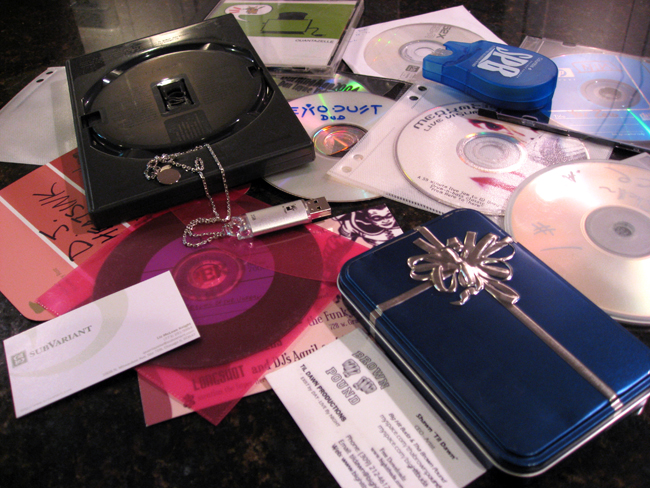
Enough of the empty cheerleading. Web-only networking can have a dark side, too — and the music community can do better. Playing devil’s advocate this week to one-dimensional Web 2.0 optimism, we welcome Dave Dri, musician, producer, and founder of Segue. -PK
I write a column for a weekly street press magazine in Australia. The vast majority of the universe won’t have picked up that magazine, of course. But my topic this week has been bouncing around Interwebs, cafes, and clubs like an alarm clock, waking the electronic music community from a happy slumber. The cause for alarm: the dire state of expectations amongst electronic music producers, digital labels and online stores.
Thanks For The Add!!!
For the host of fresh-faced producers who know only digital labels and online stores, the process of making and releasing music is relatively seamless, and entirely virtual. Countless producers have access to affordable computing power, an endless choice of software, and the ease of uploading to sites like Myspace and Purevolume. For much of this generation, the idea of marketing begins and ends with “thanks for the add!!”. Even veteran producers and performers can be lulled into the steady hypnosis of the Web and its links, emails and forum posts.
The process of song writing often finds a global audience almost as soon as one can come up with a catchy, if eventually regrettable, artist name and an upload of the latest renders. Imagine their surprise when a weekend of link farming across MySpace yields a reply from a digital record label showing interest in one or more tracks. Some emails bounce back and forth, the artist agrees to a 50% share of the profits and, soon enough, the label has uploaded a new release to Beatport. What’s not to love about this system? The producer feels validated as a “real life producer guy”, the label has another release on its books and the wheels of the music industry keep rolling.
The Back In My Day Bit
What’s wrong with this process is, basically, everything. As a contrast, let’s look at the previous generation of producers and live acts. This generation existed on the cusp of technology change and would have its feet grounded in the almost unthinkable days prior to cry of “thanks for the add!!!” These artists swapped tracks on CD-R’s with other producers in their local area and shopped and networked with local records stores by virtue of their primary access to local music alone. They stressed over refining and releasing actual EPs. They met, partied, and bought and sold music with other DJ’s, producers, promoters and music press. They refined their DJ skills or live performances and pushed music as a part of a growing local scene. They knew the local street press writers and sent out promos, hung up posters and generally interacted with the real world. IRL – in real life.
One might suggest that while the younger producers are adding each other to friend lists, the veteran live acts and producers are still out working the venues, pushing discs into the hands of promoters, and doing such wild things as asking for interviews and promotions in street press. As I asked a Web forum recently, guess what the proportion is between digital labels and producers sending MySpace and Facebook messages, versus those actually sending well-written press releases and calling to ask for interviews and promotional assistance? The answer is pretty dire, and quite telling.
Take The Red Pill
If anything positive can be taken from the state of the current industry, then it should be a revisiting of the basic ideas of the music industry. Artists should be backing up their passion for music by investing more efforts into creating better music, and pursuing the best deals from the best labels by building their profile through real-world networking and performances. Labels should be sourcing the best artists, artists whoare actually working to push their own music in the real world, and developing them with the aid of a strong network of industry captains, DJs, credible promoters and all the existing and fringe music media. That means actually writing press releases, actually getting out and meeting people, and following up important emails with phone calls. Most importantly, it’s asking for coverage across the full spectrum of media and constantly developing reasons why the act deserves it.
Really, one might say it just boils down to effort. Why an artist wants to give music to a label that spends little effort promoting a release is as hard to fathom as a label wanting to sign an artist who spends little effort creating their art and profile. Maybe your local community and musical genre mirrors these examples; maybe not. But electronic music has little to lose and everything to gain from more effort and more real-world local community.
Oh — and, before I forget, thanks for the add!

Ed.: Now, of course, I’m not going to slam online communities, seeing as I, erm, run one. But I kept thinking while reading Dave’s article how much online tools can help power real-world connections. We’ve had extraordinary opportunities getting together for events like Handmade Music. I still swap CDs. (Bet your laptop still has a CD burner, huh? It runs at, what, 60x now?) I hate press releases, even when they’re well-written. But I love real-world connections.
For more food for thought – and remember, most of the networking occurred online, whereas the demo swapping and face-to-face connection happened in person:
Meatspace Networking for Musicians: Chicago Demo Swap Party Wrap-up
How To Create a Successful Demo Disc: Tips and Resources, Chicago Event
That’s, of course, just the beginning. So to reframe Dave’s challenge, how can we use online tools to make meatspace connections easier and more powerful, for indie artists and labels alike? How can we start raising expectations again? -PK
